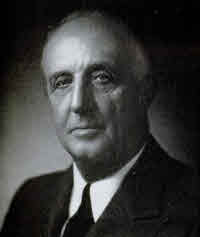The Marquette Law Professor Who Was President of the American Bar Association
 Carl Barnett Rix was never a full-time professor at the Marquette Law School, but he was a part-time instructor for almost 40 years (1908-1946). During that time he taught hundreds of Marquette law students while carrying on an active law practice and a professional life that led him to the presidencies of the Milwaukee Bar Association, the Wisconsin State Bar, and the American Bar Association.
Carl Barnett Rix was never a full-time professor at the Marquette Law School, but he was a part-time instructor for almost 40 years (1908-1946). During that time he taught hundreds of Marquette law students while carrying on an active law practice and a professional life that led him to the presidencies of the Milwaukee Bar Association, the Wisconsin State Bar, and the American Bar Association.
A Wisconsin native, Rix was born in September 30, 1878. His father was from Quebec, Canada, while his mother hailed from Milwaukee. After finishing his public school education, he became a school teacher, and from 1895 to 1899, he taught in the public schools in Cedar Creek and West Bend, Wisconsin. However, in the fall of 1899, he relocated to Washington, D.C., where he enrolled in Georgetown University to study law. He received an LL.B. degree from Georgetown in 1903 and an LL.M. degree the following year. He then went to work for the United States Bureau of the Census, but in 1905, he returned to Wisconsin where he passed the bar examination. He then set up practice in Milwaukee as a member of a law firm eventually known as Rix, Kuelthau, and Kuelthau. (He would remain affiliated with that firm for the next 58 years.)
Much of Rix’ career was devoted to bar association activities.
He served as president of the Milwaukee Bar Association in 1932 and 1933, and in the latter year, he was elected president of the Wisconsin State Bar (a position later held by current Marquette emeritus law professor James Ghiardi).
In 1946, he was elected president of the American Bar Association. In addition to his service as ABA president, Rix was also a member of the ABA House of Delegates (1941-1945), the ABA Board of Governors (1938-1941), the ABA Committee on Peace and Law through the United Nations, and as Director of the ABA Endowment Fund (1941-1945).
After his stint as ABA president, Rix became increasingly concerned that the United Nations might intrude upon United States sovereignty, and in 1952, he testified before a United States Senate committee on behalf of the Bricker Amendment, a proposed constitutional amendment designed to protect what its supporters viewed as traditional American freedoms from being compromised by what Rix called “treaty laws.” As a result of similar concerns, Rix had also, on behalf of the ABA, opposed the United Nations Convention on Genocide in the late 1940’s. After stepping down as ABA president, he remained active for many years with the ABA, devoting particular attention to the organization’s Library Services Committee.
A Republican in politics, Rix served as the campaign adviser to Gov. Thomas Dewey of New York during his successful run in the 1940 Wisconsin primary. Although Dewey was defeated for the Republican nomination that year by Wendell Willkie, he was the G.O.P. standard-bearer in the 1944 and 1948 presidential elections.
Rix was a member of the original Marquette Law School faculty, and he began teaching at the school when it first opened in the fall of 1908. He was, among the original faculty, the only professor who had been educated at a Jesuit (or Roman Catholic) law school, and he was among the Roman Catholic minority on the early faculty.
Although Rix taught a variety of courses over the years, his primary teaching responsibilities were in the fields of Real Property and Future Interests. During his stint on the faculty he served under five deans—James Jenkins (1908-1916), Max Schoetz (1916-1927); Clifton Williams (1927-1933); Acting Dean Rev. Hugh MacMahon (1933); and Francis Swietlik (1934-1946). In 1946, he stepped down from the faculty at age 67, upon his election as president of the ABA. At the time of his retirement, he was the last remaining member of the original law faculty still teaching at the law school. (Of course, that would also have been true had he retired in 1929.)
Rix never retired from the practice of law, and he died at his desk in his downtown Milwaukee law office on September 30, 1963. At the time of his death, he was 85 years old, and the only surviving member of the original Marquette Law School faculty.
A photograph of Rix as well as a tribute based upon his many years of service to the American Bar Association can be found in the November 1963 issue of the American Bar Association Journal. (Vol. 49, page 1080.)

